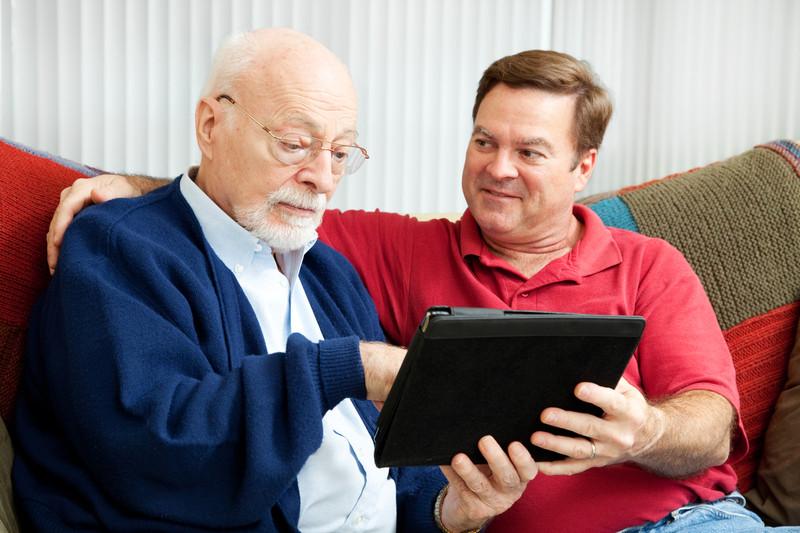The all powerful RESPITE Care
 There's no doubt that while caregiving is a loving responsibility, it can also be incredibly stressful and isolating. That's why t's so important that caregivers take both mental and physical breaks as often as possible. Breaks that are used for exercising, lunching with a friend, or even reading a book and napping have been shown to positively impact the well being of caregivers. However, in spite of its demonstrated impact, it's often impossible to find the time given the many daily contraints such as work, other family responsbilities, and finances.
There's no doubt that while caregiving is a loving responsibility, it can also be incredibly stressful and isolating. That's why t's so important that caregivers take both mental and physical breaks as often as possible. Breaks that are used for exercising, lunching with a friend, or even reading a book and napping have been shown to positively impact the well being of caregivers. However, in spite of its demonstrated impact, it's often impossible to find the time given the many daily contraints such as work, other family responsbilities, and finances.
Enter respite care, a short-term but critical extra amount of help and companionship that provides caregivers with just enough of a break to keep the caregiver burnout at bay. It's a simple solution that can make the difference between allowing loved ones to remain in their own home or not. A recent article in the Baton Rouge Advocate summarizes the benefits of respite care for both the caregiver AND the care recipient and concludes it's a win-win for all. The RAISE (Recognize, Assist, Include, Support and Engage) Family Caregivers Act was recently passed by Congress and it will convene an advisory board who will develop a national strategy to provide assistance to the more than 40 million American caregivers. Top on the list of priorities is Respite Care.
So where does one start? The AARP has developed a step-by-step guide for creating a susainable respite plan for your loved one. It begins with identifying your specific needs. Perhaps it's a little companionship in the morning or around dinnertime. a few hours of help cleaning around the home, or some hours during the weekend when other family responsibilities and activities are necessary.
The next step of Identifying sources of respite care can be more challenging. Here are four basic types of respite care resources:
- Home Care Agencies and Companion Care Companies: There are many home care companies that provide companion/respite care. Many "companion care" companies are licensed to provide homemaker type care which is by law (in Florida and many other states) non-medical, non hands-on care. The price varies among areas but one can expect to spend between 13.50- 18.00 per hour. I always recommend that one determines the most critcal times for care. For some it's early in the morning, having some to have breakfast with, and for others it's the hours surrounding dinnertime when loneliness can be at its peak. The advantage of this option is that all companions/aides that come to the home are licensed and insured and have undergone a background check by the company. You can find recommendations of reputable companies by contact your local department of elder affairs, or by asking friends who may already be experienced caregivers.
- Adult Day Care Centers: Daily programs can provide structured activities and social engagement in a safe environment for those who require close supervision. There are both private as well as county and state run centers. A good resource for this is the National Association of Adult Day Care Services (NADSA) where you'll find everything you need to know about Adult Day Care: how to choose an individual center, how to make certain it addresses your loved ones' needs and links to individual states day care associations, along with lists of individual centers.
- Family Members and Close Friends. We all know how difficult it can be to ask for help. For a variety of reasons it's not unusal for one family member to shoulder the caregiving responsibilities, and often caregivers don't communicate to their siblings how challenging caregiving can be. Siblings and other family members are likely to appreciate a conversation that will result in getting more involved and providing assistance on a regular basis. This can be true even if they live far away. Close friends also may see the need for help but do not know how to broach the subject. Many are likely to have been caregivers themselves and may be a good trusted resource to turn to for objective help and recommendations.
- Community based organizations and resources: Here are links to websites of large organizations that can help navigate one to respite care resources.
- Eldercare Locator : is part of the Department of Elder Affairs. It will direct you to local offices around the country that often offer available programs and resources that promote healthy caregiving.
- Family Caregiver Alliance : Is a non-profit organization that provides information,resources and tools for family caregivers to help locate support services in their state. Those residing in the San Francisco area can take advantage of their individual consultation services.
- National Respite Network and Resource Center: The organization helps to identify Respite Care Resources in several states.
- The Alzheimer's Foundation : offers a resource center complete with a hotline and chat option for those needing help.
Another way to search for respite care opportunities in your community is to search on google. Suggested terms would be respite, respite care, caregiving support, companioship, the city/town of residence. If you do this here are some example of what you may find.
- If you live in south Florida then you'll be excited to about a new company called Papas Pals: They offer companionship to seniors who spent too much time alone. The "pals" are individuals from the community who can help with basic chores, play games or just hang and provide social companionship. There is a monthly fee of $10.00 and an hourly fee of $15.00. One can use them as frequently as desired, and can create a small network of "pals" that your loved one likes.
- If you live in Palm Beach, Martin or St Lucie counties in Florida and have a loved one diagnosed with Alzheimer's disease you may be able to take advantage of one of eleven centers that the Alzheimer's Community Care operates.
- If you live in the Atlanta area and have a family member with Alzheimer's disease you can contact the LMK Foundation and apply for a $500 voucher that can be used toward companion care from a home care agency.
- If you live in California you may come across the Beauty Bus that offers Caregivers respite through beauty services and pampering products.
- If you live in Miami you'll want to know about Babas Bunch a non-profit organization that provides weekly respite care to caregivers of dementia patients.
- If you live in the Nashville area you'll be happy to learn about the Tennessee Respite Coaltion. They offer respite to family caregivers so they can continue to be a caregiver while maintaining their well-being.
Please let us know of any respite care programs and resources that you may know of.

